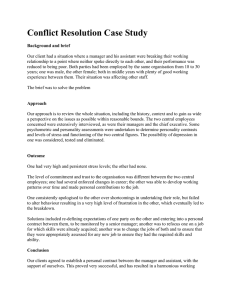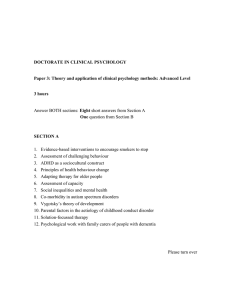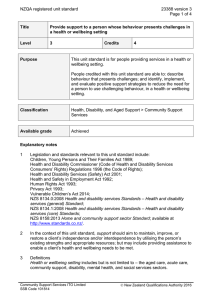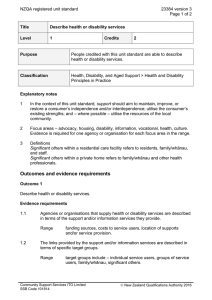NZQA registered unit standard 27315 version 1 Page 1 of 3
advertisement
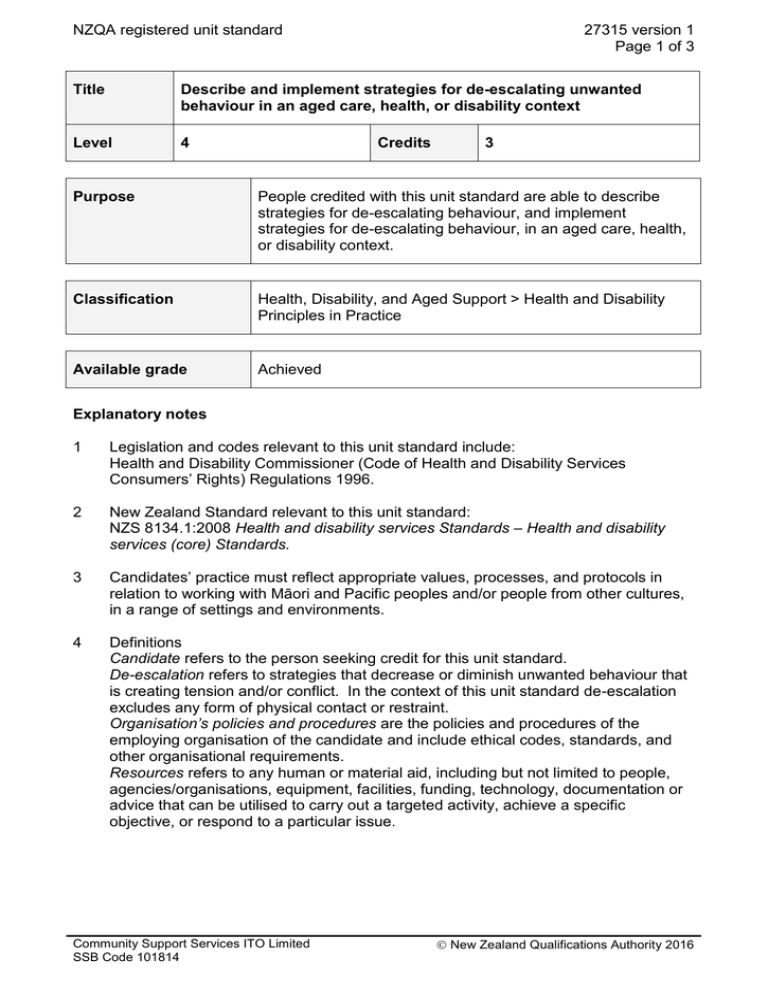
NZQA registered unit standard 27315 version 1 Page 1 of 3 Title Describe and implement strategies for de-escalating unwanted behaviour in an aged care, health, or disability context Level 4 Credits 3 Purpose People credited with this unit standard are able to describe strategies for de-escalating behaviour, and implement strategies for de-escalating behaviour, in an aged care, health, or disability context. Classification Health, Disability, and Aged Support > Health and Disability Principles in Practice Available grade Achieved Explanatory notes 1 Legislation and codes relevant to this unit standard include: Health and Disability Commissioner (Code of Health and Disability Services Consumers’ Rights) Regulations 1996. 2 New Zealand Standard relevant to this unit standard: NZS 8134.1:2008 Health and disability services Standards – Health and disability services (core) Standards. 3 Candidates’ practice must reflect appropriate values, processes, and protocols in relation to working with Māori and Pacific peoples and/or people from other cultures, in a range of settings and environments. 4 Definitions Candidate refers to the person seeking credit for this unit standard. De-escalation refers to strategies that decrease or diminish unwanted behaviour that is creating tension and/or conflict. In the context of this unit standard de-escalation excludes any form of physical contact or restraint. Organisation’s policies and procedures are the policies and procedures of the employing organisation of the candidate and include ethical codes, standards, and other organisational requirements. Resources refers to any human or material aid, including but not limited to people, agencies/organisations, equipment, facilities, funding, technology, documentation or advice that can be utilised to carry out a targeted activity, achieve a specific objective, or respond to a particular issue. Community Support Services ITO Limited SSB Code 101814 New Zealand Qualifications Authority 2016 NZQA registered unit standard 27315 version 1 Page 2 of 3 Unwanted behaviour refers to any verbal or physical behaviour that is: unsought, unwarranted, and unappreciated by an individual or a group of people; socially or culturally offensive; inappropriate in terms of the location, setting, or audience; and/or that constitutes, or could be seen to constitute, harassment; and/or belittles, threatens, ridicules, denigrates, intimidates, pressures, excludes, patronises or otherwise has an ongoing negative impact on a person or group of people to whom it is directed. Outcomes and evidence requirements Outcome 1 Describe strategies for de-escalating unwanted behaviour in an aged care, health, or disability context. Evidence requirements 1.1 Unwanted behaviour that may require de-escalation is described in terms of the organisation’s policies and procedures. Range 1.2 unwanted behaviour – verbal, physical; evidence is required for two examples of verbal and two examples of physical behaviour. Strategies for de-escalating unwanted behaviour are described in terms of the organisation’s policies and procedures. Range includes – prevention of escalation, use of available resources. Outcome 2 Implement strategies for de-escalating unwanted behaviour in an aged care, health, or disability context. Range strategies may include but are not limited to – calm communication (verbal and/or non-verbal/body language), active listening, separation and/or removal and/or disengagement of participant(s), acknowledgement of feelings and/or needs, maintaining client watch, calling for back-up, outlining boundaries of the situation, outlining potential resolutions and/or pathways to a solution, breaking a large problem into manageable segments, use of a ‘third party’ to negotiate a solution; evidence is required for the implementation of a minimum of two strategies. Evidence requirements 2.1 Strategies for de-escalating unwanted behaviour are selected in terms of the nature of the unwanted behaviour, the participant(s), the setting of the behaviour, and are in accordance with the organisation's policies and procedures. Community Support Services ITO Limited SSB Code 101814 New Zealand Qualifications Authority 2016 NZQA registered unit standard 2.2 27315 version 1 Page 3 of 3 Strategies for de-escalating unwanted behaviour are implemented in accordance with the organisation’s policies and procedures and boundaries of own role. must include – legal responsibilities; timeliness; cultural considerations; safety considerations for self, participant(s), others; may include – medical history. Range Planned review date 31 December 2016 Status information and last date for assessment for superseded versions Process Version Date Last Date for Assessment Registration 1 20 May 2011 N/A Consent and Moderation Requirements (CMR) reference 0024 This CMR can be accessed at http://www.nzqa.govt.nz/framework/search/index.do. Please note Providers must be granted consent to assess against standards (accredited) by NZQA, before they can report credits from assessment against unit standards or deliver courses of study leading to that assessment. Industry Training Organisations must be granted consent to assess against standards by NZQA before they can register credits from assessment against unit standards. Providers and Industry Training Organisations, which have been granted consent and which are assessing against unit standards must engage with the moderation system that applies to those standards. Requirements for consent to assess and an outline of the moderation system that applies to this standard are outlined in the Consent and Moderation Requirements (CMRs). The CMR also includes useful information about special requirements for organisations wishing to develop education and training programmes, such as minimum qualifications for tutors and assessors, and special resource requirements. Comments on this unit standard Please contact the Community Support Services ITO Limited info@careerforce.org.nz if you wish to suggest changes to the content of this unit standard. Community Support Services ITO Limited SSB Code 101814 New Zealand Qualifications Authority 2016
